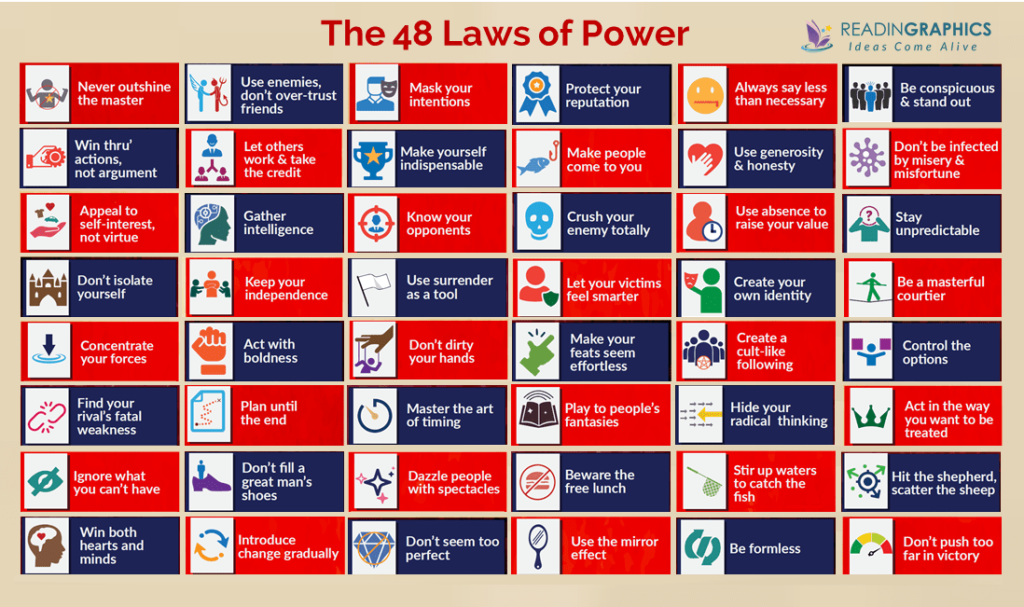“The 48 Laws of Power” by Robert Greene is a comprehensive guide that synthesizes lessons from historical figures and events to illustrate the nature of power dynamics. Published in 1998, the book is often regarded as a modern-day classic in the realm of social strategy and power dynamics. It presents a series of laws based on historical anecdotes, suggesting ways to navigate and orchestrate power in one’s personal and professional life. Each law is a principle that aims to equip the reader with strategic tools to gain, understand, and defend against power.

✅ AI Essay Writer ✅ AI Detector ✅ Plagchecker ✅ Paraphraser
✅ Summarizer ✅ Citation Generator

Overview
The book is structured around 48 laws, each illustrating a principle or strategy for acquiring power and influence. These laws draw from the lives and philosophies of various historical leaders, strategists, and thinkers, including Niccolò Machiavelli, Sun Tzu, Carl von Clausewitz, Queen Elizabeth I, and Henry Kissinger. While the book is often criticized for its cynical and manipulative approach, it also offers insights into human behavioral patterns and the dynamics of social interactions.

Insights and Criticisms
Each law in the book is illustrated with historical examples that help the reader understand how these laws play out in real-world situations. The book is pragmatic and acknowledges the darker side of human nature, advising readers on how to navigate and manipulate it to their advantage.
However, the book has also faced criticism for promoting a cynical and Machiavellian approach to life. Critics argue that it encourages deceit, manipulation, and the ruthless pursuit of power. Despite these criticisms, many find value in the book’s clear-eyed assessment of the use and abuse of power.

Application of the Laws
While the book is often associated with political and corporate environments, its principles can be applied in various contexts, including personal relationships, community organizations, and social movements. The key is to understand and adapt these laws to one’s individual circumstances and moral compass.
Similar Books
Readers interested in exploring similar themes might consider the following books:
- “The Art of War” by Sun Tzu – A classic treatise on military strategy and tactics, emphasizing the importance of deception, strategy, and preparation.
- “The Prince” by Niccolò Machiavelli – A seminal work on political philosophy, offering blunt, practical advice on acquiring and maintaining power.
- “Influence: The Psychology of Persuasion” by Robert B. Cialdini – A book that explores the psychology behind why people say “yes” and how to apply these understandings.
- “Mastery” by Robert Greene – Another work by Greene that synthesizes the lives of historical figures to extract lessons on achieving mastery in one’s field.
“The 48 Laws of Power” provides a fascinating look into the mechanisms of power that can help readers understand the power dynamics in their own lives and, if they choose, apply these lessons to navigate these dynamics more effectively.
Follow us on Reddit for more insights and updates.





Comments (0)
Welcome to A*Help comments!
We’re all about debate and discussion at A*Help.
We value the diverse opinions of users, so you may find points of view that you don’t agree with. And that’s cool. However, there are certain things we’re not OK with: attempts to manipulate our data in any way, for example, or the posting of discriminative, offensive, hateful, or disparaging material.